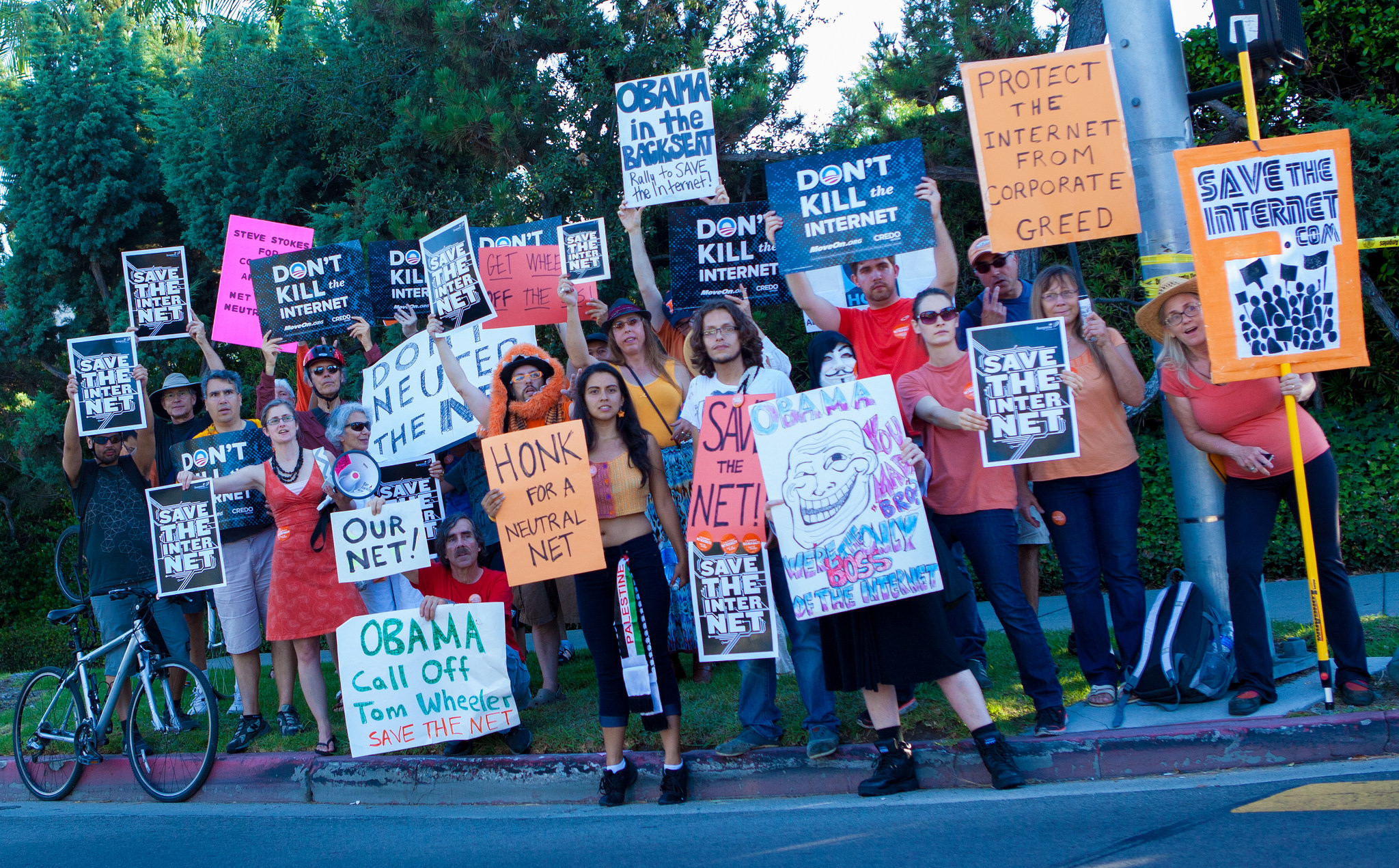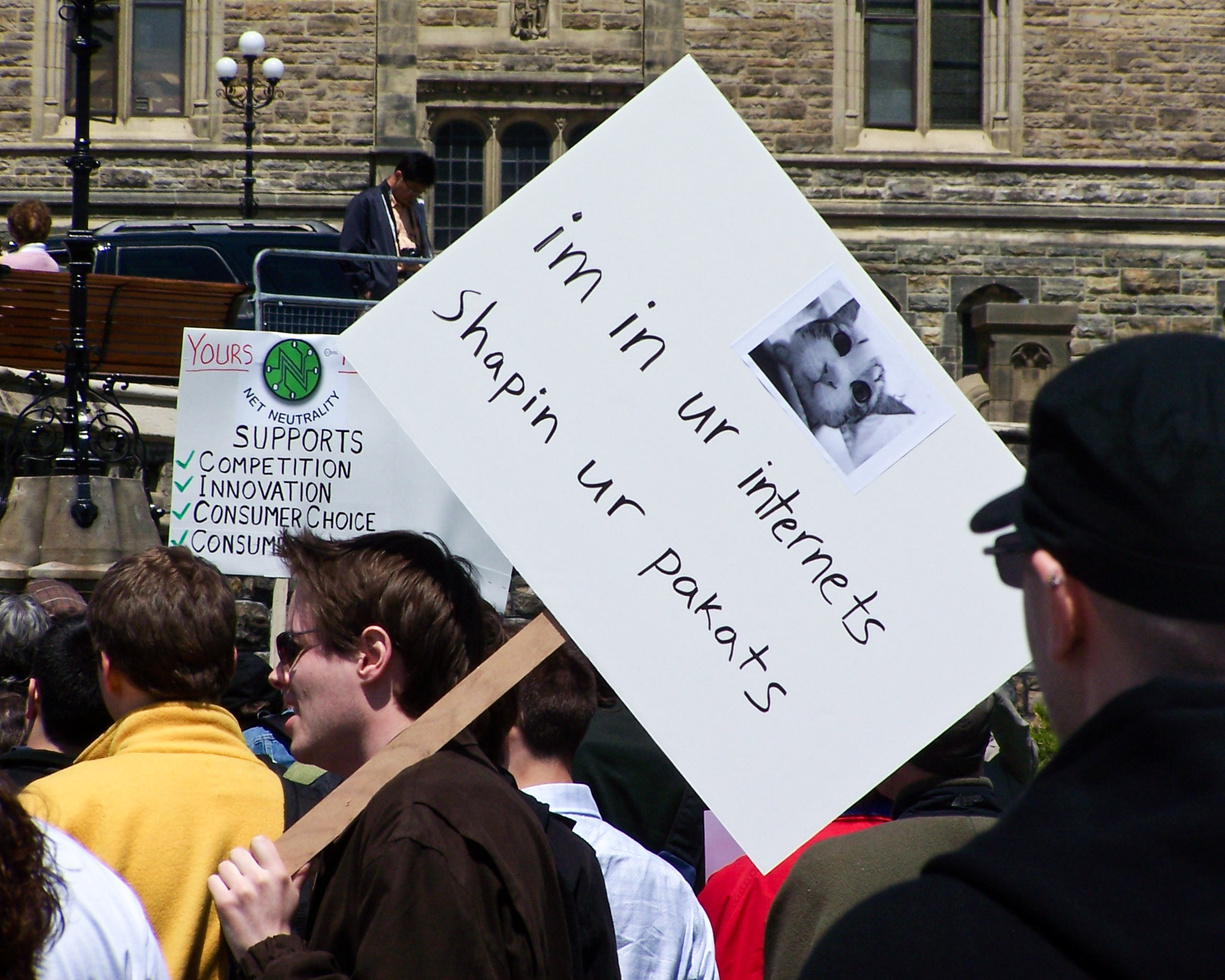This story was originally published on 1/17/17. It was updated 3/28/17 after Congress voted to repeal the FCC’s privacy rules.
Take a moment to remember the height of the net neutrality battles of 2014 and 2015. Remember the letter writing campaigns, the comments filed to the Federal Communications Commission (some of them handwritten), remember John Oliver’s rant. Remember that the people fought, and the people won, and for a brief moment, big telecom monopolies had at least some limits placed on them by the federal government.
Videos by VICE
Remember it now, because very likely, the anti-regulation commissioners of the FCC, reporting to an anti-regulation president, are about to undo the rules millions of Americans fought so hard for. Under Trump, big telecom and its sympathizers will call the shots. Net neutrality will be gutted, and FCC privacy rules will be repealed.
This means that net neutrality protections that prevent internet service providers from slowing down certain types of traffic will very likely go away. It means Netflix may once again have to pay Comcast to ensure its customers can watch shows without buffering (it also means, for example, that ISPs would be able to charge you extra to stream Netflix as opposed to content on an ISP-owned platform). It means that the blatant net neutrality violations being perpetrated by wireless carriers—the “free data streaming” for certain types of data—will continue and will likely never be stopped by the FCC. And it means your personal data can and will be sold by the big telecom monopolies that you already hate.
But the protracted net neutrality legal battle wasn’t for naught. Important seeds were sown during those months of activism that raised public awareness about an important but obscure and relatively complicated telecom regulatory rule that could have easily gone unnoticed were it not for the protests, late-night television coverage, and information campaigns on sites like Reddit.
“Because we have net neutrality now, those seeds are out there,” Christopher Mitchell, director of the Community Broadband Networks Initiative, told me. “Our biggest enemy is ignorance, so when things go badly and cable bills go up under Trump, and we have to pay more to access certain sites, people will say ‘Wait a minute, this is a violation of net neutrality.’ We’re in such a better position to fight now.”
The letter writing campaign to the FCC was good training for what will be needed in the future: Targeted, grassroots efforts that show politicians that access to the open internet matters to voters.
“In the case of ensuring net neutrality by ISPs, that means creating fertile ground for more competition”
The rhetoric and actions of the Republican-dominated FCC and Congress show that federal regulations that can be easily undone or ignored are not a long-term solution if we want to protect the open internet and consumer privacy.
To preserve the open internet, there must be more broadband competition and more consumer choice. This goal is going to be accomplished through local- and state-level activism and entrepreneurship, not through federal regulations.

Image: Free Press
“The reality is we’re not going to see much if any consumer protection policy from the next administration, so finding alternatives is a critical exercise to ensure social and economic justice prevails,” Monica Webb, who runs government relations at fiber internet startup Ting, told me. “In the case of ensuring net neutrality by ISPs, that means creating fertile ground for more competition.”
America’s largest internet and cable companies feel little pressure to sell limitless, unthrottled connections because, in many cases, they have a captive market. In many small cities and towns, there is only one real broadband choice that can remain profitable while offering a lackluster product. People who live in cities that have competition, meanwhile, get better service at a lower cost.
Competition can come from both the private sector—we need more startup ISPs that have committed to net neutrality and robust privacy protections—or it can come from local governments, who are increasingly building their own broadband networks. Focusing on increasing competition from the public sector at a local and state level seems like the most obvious place for activists to get involved.
The most obvious impediments to local broadband competition are laws that exist in 23 states that restrict local communities from building their own broadband networks. These laws were uniformly lobbied for by big telecom providers and help preserve the monopolies that these companies have in many cities and towns around the country.
Anticompetitive state-level legislation can be repealed, and new restrictions can be defeated

Image: Jason Walton/Flickr
Because they have a mandate to encourage economic growth and education in their towns rather than make profits, many local governments are exploring building their own internet networks. This model has worked well in cities such as Chattanooga, Tennessee; Lafayette, Louisiana; and Wilson, North Carolina.
President Obama and his FCC Chair Tom Wheeler supported a federal effort to preempt state laws restricting community networks, but an appeals court said the decisions must be made at the state level. Trump’s FCC will not continue Wheeler’s efforts, and a federal legislative fix seems out of the question with big telecom ally Blackburn newly in charge of the House Telecom Subcommittee.
“These decisions will continue to happen at the state and local level for the foreseeable future,” Jim Baller, who runs a law firm that helps communities navigate these laws, told me.
For activists, this means supporting legislation like Colorado’s SB17-042, the “Repeal Local Government Internet Service Voter Approval” bill that would remove a restriction requiring local communities to have ballot initiative votes anytime they would like to build internet infrastructure. Mitchell is also hopeful that repeal legislation will be introduced in North Carolina. In Tennessee, state Sen. Janice Bowling plans to introduce legislation that would repeal municipal broadband restrictions in the state.
“I’m going to push fiber to the farmer, fiber to the physician, fiber to the scholar, fiber to any person that needs it,” she told me, noting that AT&T lobbied heavily for the law that initially put restrictions. “We’re going to stop [big telecom’s] little game.”
“Blackburn and the administration will do what AT&T and Comcast want, and I’m guessing it’ll be a disaster”
Promoting competition also means telling lawmakers that legislation that will strengthen community broadband restrictions will not be tolerated. Already, bills have been introduced in Virginia and Missouri that would toughen already existing restrictions in those states. Tom Sloan, a Republican state representative in Kansas, says that public pressure is the best way to defeat this sort of legislation, which has not passed in his state thanks to voter outrage.
“Lobbyists for the large broadband providers know that some conservative lawmakers are naturally sympathetic to the argument that it’s anticompetitive,” Sloan told me. “But when the communities demonstrate their needs are not being met, that changes.”
Beyond trying to overturn these laws, people can ask their city councils to research the feasibility of building community networks that would compete against incumbent providers.
New ISP Startups can help
Community networks aren’t right for every city or town, and a handful of small internet service providers have successfully challenged big telecom companies by championing net neutrality and by offering a better overall customer experience.
Where alternatives are already available, people can support small internet companies that are dedicated to preserving net neutrality simply because it’s what customers want. Many ISP startups not only support net neutrality, they also have vowed not to sell customer data to advertisers.
“We are selling a big, unimpeded pipe,” said Dane Jasper, CEO of Sonic, an ISP that offers service in 125 cities and towns in California. “If I do things to impair access to the great stuff on the internet, that’s a self-destructive thing to do. It works when you have market power, but I feel like we need to respect the internet ecosystem.”
So far, Sonic’s total possible customer base is about 5 million people, while Ting is only available in a handful of towns across the country. It has slowly built up its infrastructure over the past two decades, first laying copper wire and then replacing it with fiber in its best-performing communities.
“Can we find 100 people to do what Ting and Sonic are doing? I’m not sure”
Many new startup ISPs seem to be doing quite well, but it’s expensive and difficult to compete with the entrenched monopolies: “There should be three Sonics in every state,” Jasper said. “We find it viable, but in the end you’ve got to build it, and then you have to convince people to switch.”
Jasper says he believes that if the Trump administration kills net neutrality it will make founding an internet service provider more difficult because it will strengthen the general economic situation of big telecom. Without net neutrality, Comcast and others can “exploit a double-ended market” by requiring companies like Netflix to pay for prioritization and perhaps by charging consumers extra to access it (alternatively, Comcast can funnel its customers to its own video on demand offerings).
“Startups with low numbers of customers don’t have the leverage to extort money out of content providers, so you’d be artificially solidifying the monopolies,” he said.
So the question, then, is whether or not new companies will want to enter a market that is already rigged against them. “Can we find 100 people to do what Ting and Sonic are doing? I’m not sure,” Mitchell said. “If the perception is Comcast can run startups out of business, it’s not going to be where people will be putting their time.”
What happens now?
Net neutrality advocates do not expect the next four years to be very good for consumers, broadband competition, or the open internet. The silver lining here is that consumers have grown used to having unfettered internet access and have shown a willingness to revolt when that general premise is threatened. So long as an open internet is an ideal that the masses want, then any steps taken to destroy it by politicians or by companies will be seen as unpopular.
If conservatives on Capitol Hill, at the FCC, and in the White House are willing to deregulate the internet and hope that the free market sorts it out, we will likely see small towns and rural areas continue to be ignored with basic infrastructure that’s necessary to live in a technologically advanced society. And Tuesday, the FCC’s privacy rules were repealed by Congress.
Mitchell said “the next four years will be worse than I expected them to be,” but said the net neutrality movement continues to march forward.
“In some ways, it’s nice that there’s no more excuses on the side of those promoting telecom interests. Blackburn and the administration will do what AT&T and Comcast want, and I’m guessing it’ll be a disaster,” he said. “I think that leads to our solutions being more politically popular in a few years.”
It also means that there’s a constant appetite for new broadband companies that are committed to protecting the internet. If you’re an entrepreneurial type, it might be a good time to start laying fiber. If you’re an organizer, it’s time to promote politicians and policies that support local competition.




